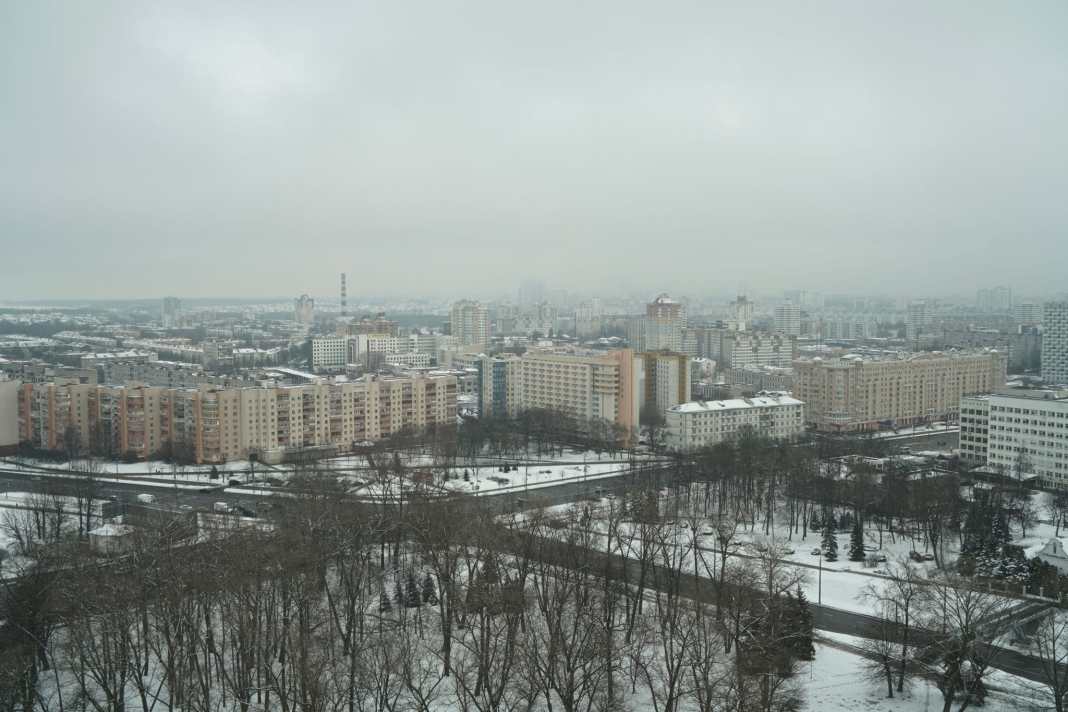Living in Belarus
Belarus, December 2017
Nearly three decades ago the Sovjet Union disintegrated, fragmenting into a multitude of states, each developing their own way. I am in Belarus and the sensation emerges the clock just stopped ticking here. As if a giant freezer has been turned on 40 years ago. Identical flatblocks and oversized avenues dominate the city sky-line. Police are everywhere the eye goes and all deviant behavior is spotted and immediately addressed. Traffic is highly regulated and controlled.
Minsk is a surrealistic place where time the Sovjet Union still fully in operation. Lenin statues elsewhere removed are still prominent as are street names like vulitsia Karl Marx. Memorials in heroic style of the great war 1941-1945 ((note: not 1940) are everywhere and covered with flowers. Sovjet style department stores like Gum and Tsum on the wide Stalinistic avenues serve customers in much the same style as before 1991.

The state is also omnipresent in the form of immaculately dressed soldiers, both men, and women. Sovjet style fur hats and officers wearing attire to impress are a common sight. All buildings of some importance are guarded and the metro stations are swarming with staff. All are visibly well treated by the system and accordingly loyal. People behave obediently in public places and crime is absent as the chance of getting caught is high. Crossing a street on foot when the traffic light is red costs money as there will be someone noticing. In a cafe, I am quietly warned: the walls have ears here. Internet and telephone are a state monopoly. Buying a telephone card requires passport registration and any wifi use telephone number registration.
Korpus Kulturtsentr
Alexander (Sasha) has studied cultural studies in Vilnius, Lithuania and has been traveling (and working) in Europe. He is in his forties and has had many occupations. He is also a dancer with some reputation.
“Most people have several jobs to survive”
Sasha says, “some do painting or construction work here, some administrative job there and at night be a DJ or make music”.

He himself has been organizing concerts and art projects for a long time too. First, he rented places for the performances but last year he and 2 friends have started their own multi-functional art venue place with the name Korpus cultural center, named after the type of building they occupy. It has been a factory and is now converted to other use.
These abandoned industrial buildings scattered around Minsk are referred to as “korpus”. Sasha’s building is korpus nr 8 while the building itself is called Horizon. Most are owned in some form or another by banks in order to make some return on investment until a bigger deal can be struck. With Chinese that will build a shopping mall for example. Chinese characters are seen on traffic signs and Chinese made cars (in a joint venture with a Belarus and Iranian partner) are a normal sight in the streets. But till the Chinese turn up (or the rent is increased) Sasha and his friends have his place.

Korpus has a stage where music, dance and theatre performances are given but his venue is open for all sorts of cultural happenings. In summer there is an open-air cinema outside in the courtyard. They will make an ice rink in winter. There are also small shops in the building as well as workshops, fashion ateliers, and offices for small businesses. Sasha and a team of 6 are doing everything possible to make Korpus a success and so far it works.

Small business in the streets
Poor people are not seen on the street nor are beggars or people sleeping in the street. Sasha tells me the government does not want them insight as it makes a bad impression. Live music in the metro is tolerated here and there as is selling of products in the underground passages and outside the station. The vendors turn away from my camera as I could be an official. When policemen come insight they will be away in seconds. These small black/grey market entrepreneurs are a sharp contrast with the huge shopping centers found everywhere. Sasha says the need and willingness to do anything for a living has resulted in the imprisonment of many young, university-educated people as they went into the drug business.

Dance teaching
Performances at Korpus include dance and during a jam/performance, I meet two dance teachers. They specialize in contemporary dance (contact improvisation) which is only appreciated here by a small group of people.
A video impression can be seen here: CI
It is difficult to make a living by teaching modern dance they say and the last 5 years things have deteriorated further. There is less money and the brain drain of the more educated is felt.
Actually it is hard to make a living at all. Ballroom dancing, tango, Latin, pool dancing are better appreciated by the general public as is yoga but there is just little discretionary income to spend. To start a dancing school on your own is a nightmare of red tape. Apart from all sorts of documents and stamps the state levies serious taxes on small activities too making it hardly feasible to operate legally. So the solution is to multitask, have an office job on the side if one can get it and use the grey circuit.
 The dancing teachers (female) say to make a living is especially complicated for women in former Soviet countries (as described else in Insights). There is a surplus of females vs males as males have better chances to emigrate but also as the life expectancy of men is considerably shorter. It is more difficult to get a good job as a woman, even with university education. Salaries in medical professions (where women are over-represented) are very low.
The dancing teachers (female) say to make a living is especially complicated for women in former Soviet countries (as described else in Insights). There is a surplus of females vs males as males have better chances to emigrate but also as the life expectancy of men is considerably shorter. It is more difficult to get a good job as a woman, even with university education. Salaries in medical professions (where women are over-represented) are very low.
With a small office job, one can earn around 400 Euros. Between 200 to 300 is needed for rent. Side jobs bring a bit extra here and there. This income is typical for those who have a job as an employee e.g. as a receptionist at a good hotel. One can choose:
“either have a roof above your head or eat”
is often said.
Outward silence
Belarus has around 9 million inhabitants (the number is decreasing due to emigration and a faltering birth rate) and I have met just three of them. Time is too short to investigate this enigmatic country more deeply. Sasha describes his compatriots as warm but reserved for the outside world. Inside they want to fight but then, in the end, decide not to do this as it would again lead to another disappointment. They are good “social actors”. For me, Belarussians are remarkably kind, friendly, polite and hospitable. They take their fate with outward silence.
When leaving Korpus Sasha points out a wall painting that summarises all: a kneeling person is worshipping the party line while a gun is ready to commit suicide…
What binds Sasha and the dance teachers is that they are examples of a generation found all over Europe and its neighbor lands sharing similar dreams and interests. And trying to make them come through.
Note: on request of the interviewed not all information was published.


















